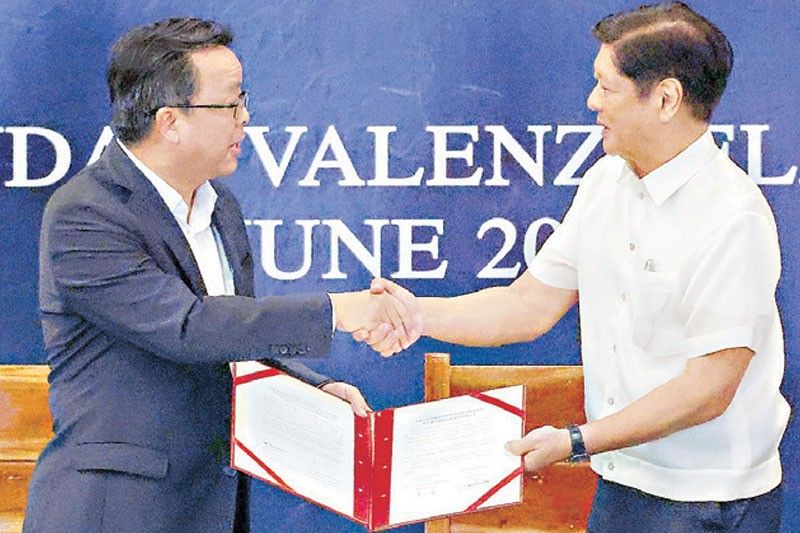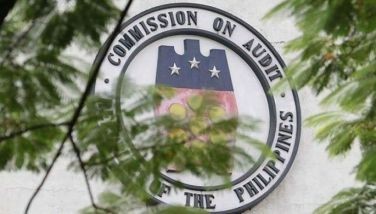President Marcos staying on as DA chief

‘Cabinet execs don’t want me to leave’
MANILA, Philippines — President Marcos is keeping his job as agriculture secretary until systems are in place to ensure food security and better living conditions for the country’s farmers.
Marcos made the remark at yesterday’s turnover of 20,000 metric tons of urea fertilizer donated by China in Valenzuela City, where reporters asked him whether or not he is considering someone to be a full-time secretary of the Department of Agriculture (DA).
“I’m asking all of them (Cabinet members). I’m waiting for them to volunteer as secretary. They don’t want me to leave,” Marcos said, partly in Filipino and in jest.
He said he needed to first put in place structural changes in the agency before vacating the post.
“What I aspire is by the time I leave the DA, we will have systems in place so that we can guarantee the food supply of the Philippines, number one; we can guarantee that the prices are affordable and, number three, that our farmers make a good living,” the President said.
“Until we finish that, I suppose you will just have to put up with me as DA secretary,” he added.
Several senators and other sectors have urged Marcos to appoint a permanent agriculture secretary.
Meanwhile, Marcos thanked China for donating 400,000 bags of urea fertilizer, weighing a total of 20,000 MT, to the Philippines.
The President and Chinese Ambassador Huang Xilian were together during the turnover held at the National Food Authority (NFA) warehouse in Valenzuela City.
“On behalf of the Filipino people, let me extend our deepest gratitude and appreciation to the Chinese government and its people for this donation – a solid gesture of friendship and goodwill that is in keeping with our long and storied history of trade and cultural exchange,” the President said.
The fertilizers will be distributed to around 160,000 rice and corn farmers in Regions 1 (Ilocos), 2 (Cagayan Valley), 3 (Central Luzon), 4A (Calabarzon) and 5 (Bicol) that will cover 200,000 hectares at two bags per hectare.
The fertilizers will be distributed to the farmers through vouchers to be issued by the local government units, according to Marcos. Last June 14, the DA issued Special Order No. 40 for the distribution of the 19,500 MT of the donated fertilizer to rice farmer-beneficiaries in Regions 2, 3, 4-A and 5 within this wet season cropping to boost rice productivity.
Under the order, 125,000 50-kilogram bags of fertilizer are allocated for Region 2; 172,000 50-kg bags for Region 3; 29,720 50-kg bags for Region 4-A and 63,280 50-kg bags for Region 5.“Fertilizer distribution under this fertilizer donation program shall be in synchrony with the fertilizer assistance program where the fertilizer discount voucher scheme is implemented,” read the order signed by DA Undersecretary for rice industry development Leocadio Sebastian. Farmers with rice areas of 0.1 to 0.6 hectare are allocated one bag, those with 0.61 to 1.1 hectares two bags and those with over 1.11 hectares will have an additional bag for every 0.50-hectare increment.
“Currently, fertilizer prices in the country are high, forcing our farmers with limited resources to decrease their fertilizer application. This affects the productivity of our major crops, including rice. This increase in fertilizer prices also reduced DA’s capacity to sustain the level of fertilizer assistance provided to its farmer-beneficiaries,” it said. ?Lowell Rebillaco, rice program focal person for Region 3, gave a slightly bigger figure on Central Luzon’s allocation, saying the region’s farmers will get 174,000 bags of urea fertilizers.
Rebillaco said the distribution in Region 3 would be as follows: Aurora, 17,860 bags; Bataan, 4,560 bags; Bulacan, 1,880 bags; Nueva Ecija, 78,640 bags; Pampanga, 24,620 bags; Tarlac, 36,500 bags and Zambales 7,940 bags.PSAC
Meanwhile, the Private Sector Advisory Council-Agriculture Sector recently reported its accomplishments to the President, which included the removal of the Authority to Release Imported Goods requirement of the Bureau of Internal Revenue for agricultural non-VAT products.
The PSAC’s recommendation on importation of fish in Luzon from November 2022 to January 2023 and in Mindanao from December 2022 to February 2023 was well executed, the group said.
The council also emphasized the importance of strategic planning for sugar importation, and suggested that imported sugar stocks be physically present in the country between May and July 2023.
The PSAC-Agriculture Sector is headed by La Filipina Uy Gongco Group of Companies president and chief executive officer Aileen Christel Ongkauko.
During their meeting in Malacañang, NFA Administrator Roderico Bioco and DA Undersecretary Drusila Bayate were ordered by the President to look into the feasibility of putting up silos to store 30-day buffer stocks of rice and corn in the country.
“We should really look into it (silos) because it’s a successful program,” Marcos said, noting such rice stations and modules have been a preferred solution in other countries to ensure an adequate buffer stock of rice and other produce.
For her part, Ongkauko said the efficiency of building rice and corn station modules using a mother-daughter or hub and spoke system has already been seen in countries like China, the United States and India.
The proposed mother-daughter stations for rice and corn storage will complement the administration’s Food Security Infrastructure Modernization Plan to ensure sufficient stock and stable prices of rice and corn, the PSAC said.
Under the proposal, 30 mother stations will be built all over the country. Each mother station will have 10 daughter station modules, which would be built in a 30-kilometer radius away from the main station.
The stations will serve as a storage for rice and corn for buffer stocking for 30 days at any given time.
Ongkauko said the project may be implemented through the public-private partnership scheme as each mother station may cost P5.7 billion each or P170 billion for the entire project.— Danessa Rivera, Ramon Lazaro
- Latest
- Trending
































